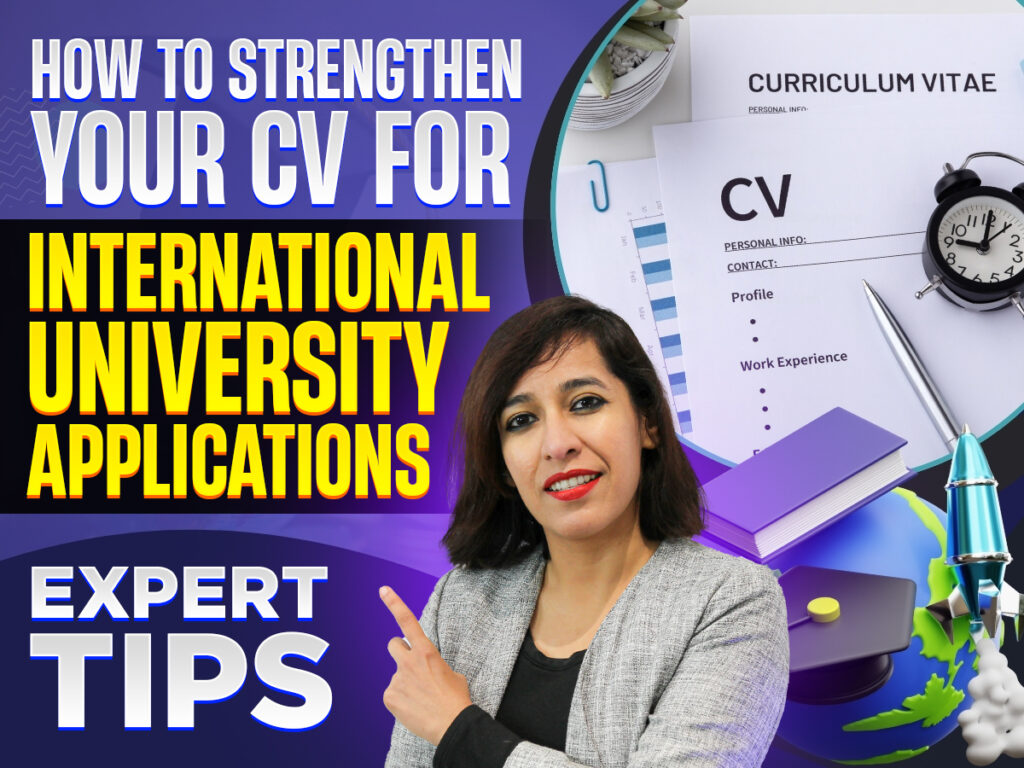Creating a compelling CV for international university applications is crucial for students aiming to stand out in a competitive field. By following specific guidelines, your CV can become a vital asset for securing admission. This blog post will provide expert tips on how to strengthen your CV for international university applications, ensuring that it stands out in a competitive field.

Understanding the Importance of a Strong CV for International University Applications
A Curriculum Vitae (CV) serves as a comprehensive summary of your academic background, work experience, skills, and accomplishments. Unlike a resume, which is typically a brief overview, a CV can extend beyond two pages and delve into greater detail about your qualifications. For international university applications, the CV is often one of the first documents reviewed by admissions committees, making it essential to present a polished and professional image.
Key Elements to Include in Your CV for International University Applications
- Personal Information: Start with your full name, contact information, and professional email address. Avoid including personal details such as age, gender, or marital status, as these are not necessary and could lead to bias.
- Objective Statement: While some experts suggest omitting an objective, a brief statement can clarify your goals and motivations for applying to a specific program. Tailor this statement to reflect your aspirations and how they align with the university’s offerings.
- Education: List your educational background in reverse chronological order, including the names of institutions, degrees obtained, and dates of attendance. Highlight any honors, relevant coursework, or projects that pertain to your intended field of study.
- Work Experience: Include any relevant internships, part-time jobs, or volunteer opportunities. Focus on roles that demonstrate skills applicable to your chosen program. Use bullet points to describe your responsibilities and achievements, quantifying results where possible (e.g., “Increased social media engagement by 30% during my internship”).
- Skills: Create a section dedicated to skills that are relevant to your field. This can include technical skills, languages spoken, and soft skills like communication or leadership abilities.
- Extracurricular Activities: Highlight involvement in clubs, organizations, or sports that showcase your leadership, teamwork, and commitment. This section can help paint a fuller picture of your personality and interests.
- Publications and Presentations: If applicable, include any research papers, articles, or presentations you’ve authored or contributed to. This demonstrates your engagement with your field and your ability to communicate effectively.
- References: Conclude your CV with a list of references who can vouch for your academic and professional abilities. Make sure to ask for permission before listing someone as a reference.
How to Tailor Your CV for International University Programs/Expert Tips for Strengthening Your CV
- Tailor Your CV for Each Application: One of the most effective ways to strengthen your CV is to tailor it for each university and program. Research the specific requirements and preferences of the institution you are applying to. Highlight experiences and skills that align with their values and mission. For example, if a program emphasizes research, make sure to showcase your research experiences prominently.
- Use Action Verbs and Quantify Achievements: When describing your experiences, use strong action verbs such as “developed,” “managed,” “led,” and “designed.” This not only makes your CV more engaging but also conveys a sense of initiative and accomplishment. Additionally, quantify your achievements whenever possible. Instead of saying you “assisted in organizing events,” say you “coordinated three successful fundraising events that raised over $5,000.”
- Keep Formatting Clean and Professional: A well-organized CV is easier to read and leaves a positive impression. Use clear headings, bullet points, and consistent formatting throughout the document. Stick to a professional font like Arial or Times New Roman and maintain a font size between 10 and 12 points. Ensure there is adequate white space to avoid a cluttered appearance.
- Proofread and Edit: Errors in spelling or grammar can undermine your credibility. Always proofread your CV multiple times and consider asking a trusted friend or mentor to review it as well. They may catch mistakes you overlooked and provide valuable feedback on content and clarity.
- Include Downloadable Templates and Resources: To assist readers further, consider providing downloadable CV templates tailored for various fields or countries. This can serve as a practical resource for students looking to create their CVs from scratch. Additionally, include links to online CV builders that can simplify the process.
- Highlight International Experience: If you have studied or worked abroad, be sure to highlight these experiences. International exposure can demonstrate adaptability, cultural awareness, and language skills, all of which are highly valued by universities. Describe your experiences in a way that connects them to your academic goals.
- Click here to learn about how to find jobs in the UK directly from India.
Common Mistakes to Avoid
- Generic CVs: Sending a one-size-fits-all CV can signal a lack of effort. Always customize your CV for each application.
- Overloading with Information: While it’s important to be comprehensive, avoid including irrelevant details. Focus on what matters most to the program you are applying for.
- Neglecting to Update: Ensure your CV is current. Regularly update it with new experiences, skills, and achievements.
- Ignoring the Importance of Design: A visually appealing CV can make a significant difference. Avoid overly complex designs; instead, aim for a clean and professional look.
- Forgetting to Include Keywords: Many universities use applicant tracking systems (ATS) to screen CVs. Incorporate relevant keywords from the program description to increase your chances of passing the initial screening.
Conclusion
A strong CV is a vital component of your application to international universities. By following these expert tips and tailoring your CV to each application, you can present yourself as a compelling candidate. Remember to focus on clarity, relevance, and professionalism throughout your document.
For additional support, consider downloading our CV templates and using our checklist to ensure you include all essential elements. Strengthening your CV is not just about listing experiences; it’s about crafting a narrative that showcases your potential and readiness for the challenges of higher education.
Explore YOUR KNOWLEDGE BUDDY for personalized guidance on creating the perfect CV for international university applications, tailored specifically to your study abroad goals.
Catch me on LinkedIn | Instagram | YouTube
FAQs
What is the difference between a CV and a resume?
A CV is a detailed document that includes your academic background, work experience, and achievements, while a resume is a brief summary typically used for job applications.
How long should my CV be for international university applications?
Your CV should be comprehensive but concise. Aim for 2-3 pages, focusing on relevant information tailored to the specific program and institution.
Should I include an objective statement in my CV?
An objective statement can clarify your goals and motivations, but it’s optional. If included, tailor it to reflect your aspirations and how they align with the program’s offerings.
How can I make my CV stand out to admissions committees?
Tailor your CV for each application, use action verbs and quantify achievements, and highlight relevant experiences and skills. A clean and professional format also helps.
What common mistakes should I avoid in my CV?
Avoid generic CVs, overloading with irrelevant information, neglecting updates, ignoring design, and forgetting to include keywords relevant to the program.

